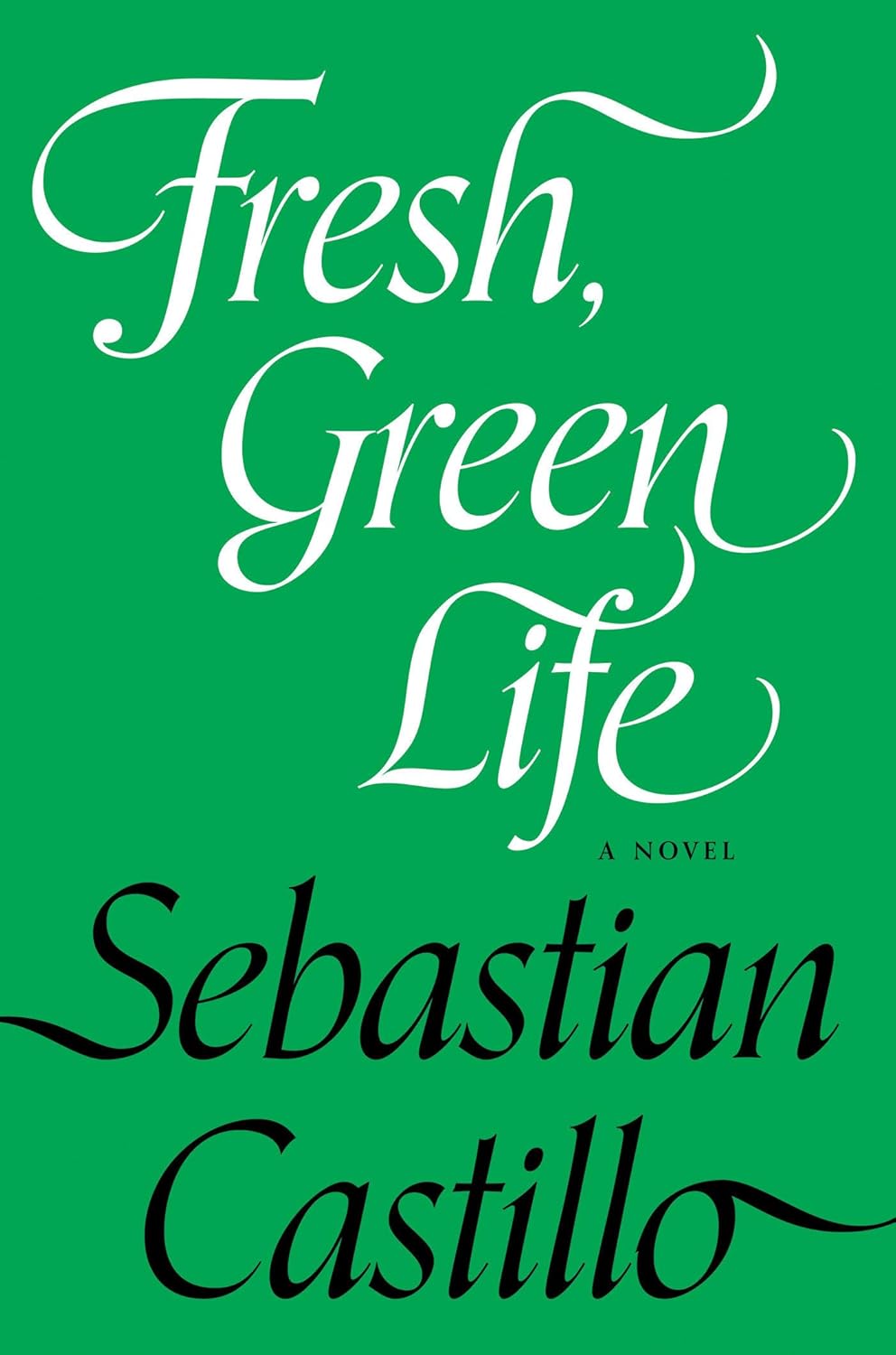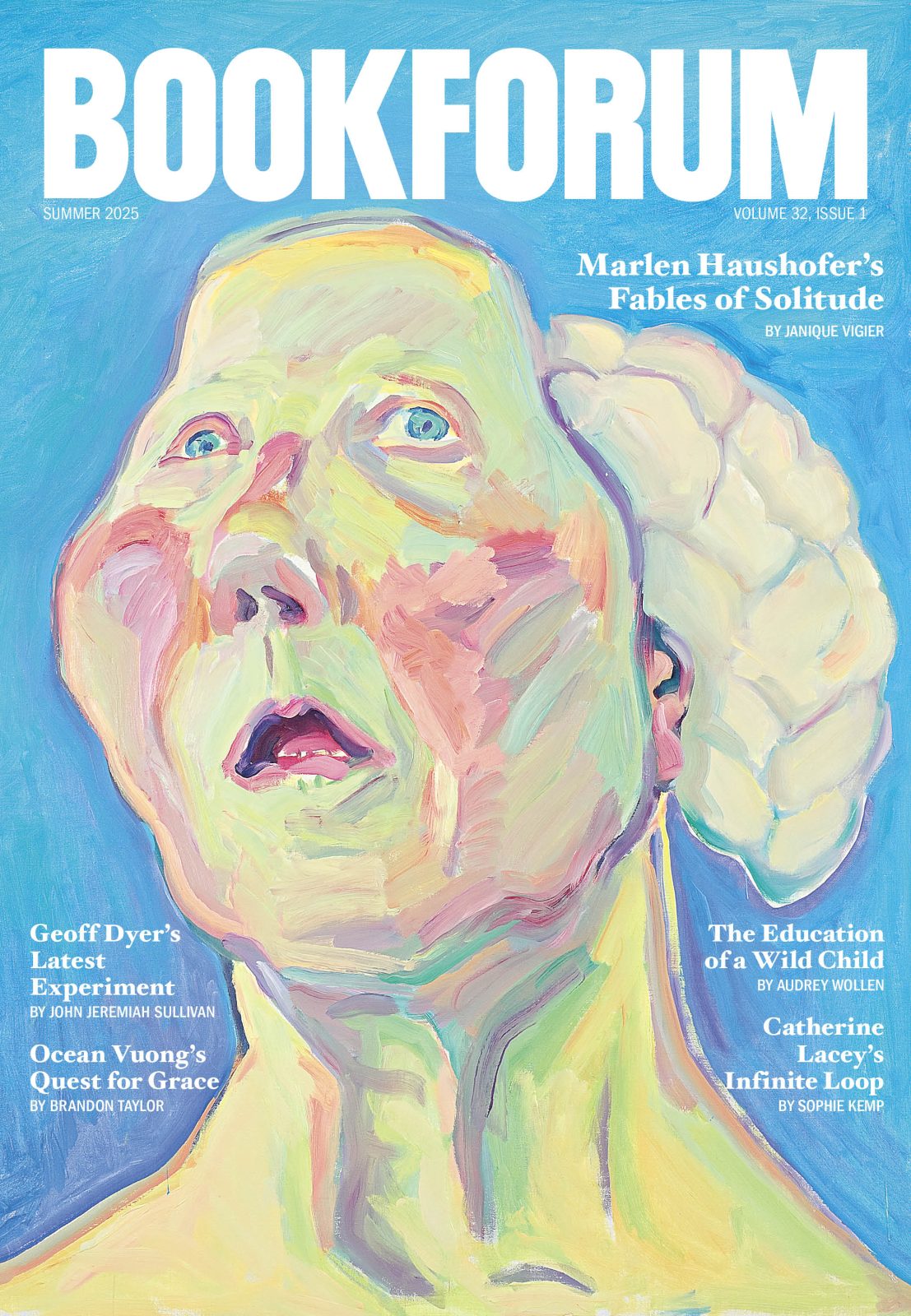
SEBASTIAN CASTILLO, THE AUTHOR of Fresh, Green Life, is also the name of the book’s narrator. A reader, reasonably, might start by thinking about autofiction as an animating principle, but that’s not really Castillo’s concern in this brief novel, nor was it the focus of his last, a hybrid of fiction and drama called SALMON (2023), which also featured a character named Sebastian. Castillo is working in the tradition of Emil Cioran or Thomas Bernhard—especially in Old Masters—or any twentieth-century writer who worked with the character of an isolated man who assigns himself an overdetermined, selfish experiment to show the world what real discipline is. In Old Masters, an aged music critic named Reger sits in front of a Tintoretto painting for at least three hours every day, a level of narcissism that Bernhard presents like a Marx Brothers routine. Reger considers, in a babbling version of empathy, “the exhausted visitors to the museum, who enter the Bordone Room totally exhausted and would like to sit down on the Bordone Room settee, it is of course unfortunate that I am sitting on the Bordone Room settee but I cannot do otherwise.” Castillo gives us similarly deluded types, characters who undertake to be the most well-read and principled lunatics in town and end up being of little use to those around them or themselves. Fresh, Green Life demonstrates how fun misanthropy can be as a linguistic gambit and how poorly it plays as a spiritual position. We get the feeling that Castillo read his gloomy forebears carefully enough not to mistake their comedy for scripture.
Sebastian Castillo (the character) is a young man disgusted enough by life that he takes a yearlong vow of silence and pines after his one true love. In SALMON, a narrator named Poet starts a timed journey that is a cousin to Fresh, Green Life’syear of silence and tension: “My resolve was simple: to say no to the dailiness of life. I would travel to SALMON, where I would be servant, steward, and teacher for a period of one year in their public schools.” The narrator is a poet whose “resolve proved inadequate in the face of the world’s cheerlessness” and whose “path had crisscrossed with the very spirit of disruption that seems to so fervently penetrate our age.” This tone of voice is Castillo’s real comic weapon, an anachronistic use of language that immediately places the reader in a present that leans heavily toward the past. Common to both SALMON and Fresh, Green Life,this priggish, waddling tone slides a monocle between the voice of the book and our world. The narrator’s inflated erudition seems (we think) to exist in the same world as the reader, though the connection between the two melts in all the fussiness. Castillo keeps returning to characters who want to leave society and use antiquated syntax that makes it seems like there won’t be in any smartphones in the story (though there are).
SALMON is apparently “one of the many small nations that cropped up in the fallout of that great war,” the first fictional intervention that makes this not quite the world as we know it. The “old guard officials” of the previous SALMON government were marched into a “great fire” built in the capital, and that was that for them. The narrator is in that same vaguely Anglican middle distance of nowhere that Ottessa Moshfegh’s McGlue takes place in—his parents might even live in an old shoe. The narrator sets up his parents with a boy from the village to help during his absence, to which his mother shouts, “He reeks of ocean!” This boy “was often smeared with some kind of ash, particles of a mysterious nature,” lending the scenario a pre-industrial feel. “He had but a single tooth in his mouth,” the narrator writes, “and I heard by way of our local butcher that he used it deftly.” The candlestick maker cannot be far behind. Again, the pleasures of fiction allow these distortions of consciousness, something film can sometimes do but never with the same infinite refining of reality. SALMON could be a book about you and your life, if you walked through your days pretending to be stranded in 1843. And why not?
SALMON doesn’t stay in anything like a present day for long. Poet boards a ship to SALMON and meets something of a modified doppelgänger named Sebastian. We end up meeting pirates and pigs and reaching the island SALMON only for the novel to become a play involving characters named DISGRACED WIZARD and GOLDEN BOY (both true to their names). The whimsy and fantasy are surplus to requirements, though it is worth noticing that Castillo is playing with an alternate version of himself already. For the fantastical, I prefer Castillo’s extremely brief 2017 book, 49 Venezuelan Novels, a collection of paragraphs, each intended to be as rich as a novel. (Think of it as 49 Venezuelan Bouillon Cubes.) We hear about bank robberies and mysterious blue boxes and novels in various states of completion. In the aggregate, it works very well as a summary of a mind in flux, questioning how to write a novel at all.

FRESH, GREEN LIFE succeeds by limiting the whimsy and making the surreal elements all close enough to plausibility to replace the slack energy of a goofy daydream with the tension of everyday anxiety. Castillo, the author, was born in Caracas in 1988, and both of his parents are ballet dancers. The author moved to Mount Vernon, New York, with his mother when he was eight, though his father remained in Venezuela. An MFA in fiction brought Castillo to Philadelphia in 2013, where he has lived (give or take a year) ever since. His work as an adjunct has taken him to several schools, including Temple and the University of Pennsylvania. The Sebastian Castillo of the novel is also an adjunct who lives in South Philadelphia, though he is Colombian rather than Venezuelan. Instead of 49 Venezuelan Novels, this Castillo wrote a book called 57 Colombian Novels.
Misanthropes are easy companions for a reader, because they feel automatically unreliable, as narrators, without having to announce much, and we know their loathing is aimed at nobody so much as themselves, even if they are truly committing to the bit. We also don’t have to worry about whether or not we need to cheer for the misanthrope, as the construction doesn’t demand that we do. The pleasures are both reliable and light—if harm befalls a misanthrope, who do we blame? This narrating Castillo considers his one New Year’s Eve option, the engine of the brief book: Should he attend a New Year’s Eve party being thrown by his former teacher, known here as Professor Aleister? The invitation makes it clear that Castillo’s love object, Maria, has been invited, adding another quick battery to our narrator’s libidinal pack. Will Sebastian finally win Maria over? Will he reconnect with the old gang? Will he say something out loud?
The Victorian tinge to our narrator’s voice gives the story just the right level of unreality (no need for talking pigs or disappearing boats): “I reread the invitation many times, and couldn’t help but notice Professor Aleister’s italicization of Maria’s purported presence: perhaps he knew how I had felt about her all throughout my schooling years, how I had never done a thing about it, not once, and how possibly that fondness had still not dampened over the years.” One senses the manuscript for this book was written by candlelight, perhaps near a broad heath. Our fictional Castillo goes on to say he has become “lissome and statuesque” due to diet and exercise, giving him better odds with Maria. But we are in the present, digital world and all. Castillo discovers Maria is divorced by taking the truly modern route and stalking her on Instagram.
This Professor reads like some weird future rendition of the Castillo character: pretentious enough to be consistently confusing. For one semester, the entire syllabus is a single line from Eliot: “The wisdom only the knowledge of dead secrets.” In other semesters, the syllabus was a single line from Emerson or Frost. It is unclear if Aleister is a hero or a figure of fun for giving our narrator an A on every hastily written paper. “I was certain he did not read them beyond the titles, which, I admit, I had put great effort into fashioning as clever puns: something like, ‘Nasty Kant: Gender, Affective Altruism, and the Categorical Imperative.’”
During their time in college together, Castillo, Maria, and their sidekicks Robert and Thomas go to the Professor’s house for free wine and food. Maria is the only one who stands up to Aleister’s cheesy provocations: “Once, for example, when discussing Ancient Greek and Hellenistic philosophy, he wondered aloud, following the way of life put forward by the Socratic method, as he put it, whether a person could be considered a student unless they had been fucked in the ass by their teacher.” When Maria practices turnabout and asks about students fucking their teachers in the ass, he says, “That has never happened in the history of education,” and that’s the end of the night.
The unreality, though, mostly applies to Castillo, and his entire cast of mind. Maria seems to be a projected ego figure, speaking perhaps to the reader and Castillo at the same time: “The more our speech mimicked that of an eighteenth-century German Idealist, she had said, the less we knew what it was we were talking about.” How much has the narrating Castillo turned this college experience into fable, where he becomes the cautionary tale of Professor Aleister and Maria is the voice of common sense not tended to?
“Professor Aleister had gotten through the life of an academic at the tail end of an era where one was given quite a bit of freedom in and outside of the classroom,” Castillo writes. “It was a perfect job, it must be said, for the incredibly lazy.” As much as the narrator is hoping to explain to Maria, in a very German way, that he has gotten impossibly fit not to be seen as “admirable” or for vanity’s sake but so as to become an archetype of a good person, and as much as he wants to resurrect their private jokes, it is the Professor who seems to be the real object of cathexis here. If not German, and time traveling from the nineteenth century, the narrator simply seems to have come from some other place that barely exist (perhaps SALMON?): “I closed the web browsing application for my student loan debt and switched to a social media application, one that focused on the writing of short, text-based posts.” Is he Mork? Is he Spock? Who has the narrator hallucinated himself into?
By the time Castillo goes to his professor’s house, some genuine momentum has built up. Which of these people actually exist? Will someone in the world be able to confirm that he is actually ripped now? He passes youths in the Fishtown neighborhood of Philly who are talking about getting some “podcast pussy” and our Young Werther 2.0 does not disappoint: “I found their blitheness untoward.” As Castillo nears the Professor’s apartment, he finds himself recalling their relationship since leaving school, which involved lots of declined invitations amid shared love of obscure writers like “Angus Onions III,” who may or may not exist. The denouement is actually worth saving for you to experience yourself. Telling you he finally breaks his vow of silence will not spoil anything. You will not ultimately be asked to love or forgive or even understand anybody in the book, and this is a gift that feels incredibly generous.
Sasha Frere-Jones is the author of the memoir Earlier (Semiotext(e), 2023).
